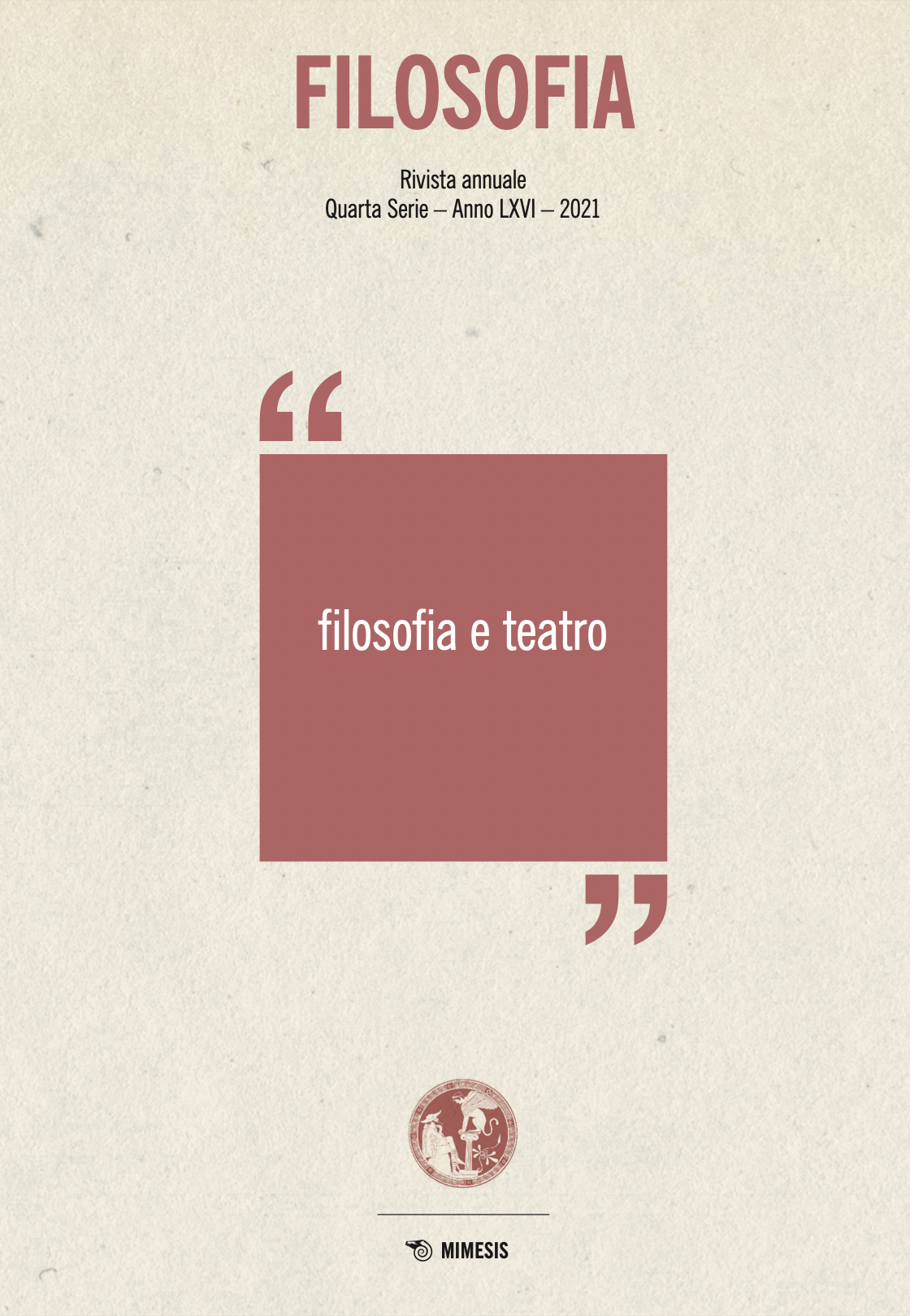L’eco del pensiero rosacrociano nell’idea di teatro tedesco del secondo Settecento
DOI:
https://doi.org/10.13135/2704-8195/6274Parole chiave:
pre-romanticismo, Germania, Rosacrucianesimo, esoterismo, ShakespeareAbstract
German Rosicrucianism, as Frances Yates notes in her famous studies, was a historically recognizable style of thought at the beginning of the 17th century, that had its origins in the scientific, mystical and poetic aspirations of the Elizabethan age. As an anti-Catholic movement, opposed by the Jesuits, it was short-lived, but it transmitted to the 18th century its theoretical legacy, which included the idea of the centrality of theatre. In light of this, the radical renewal of theatre that took place in the German-speaking world, starting with Lessing’s departure from the French Aristotelian model and making Shakespeare and Nature its banner, can be considered differently, as not in contrast to traditional theatrical historiography.
Downloads
Riferimenti bibliografici
Andreae, Johann Valentin. 2006. Le Nozze Chimiche di Christian Rosenkreutz. Anno 1459. Tr. It. Elsa Eichner, a cura di. Milano: SE.
Andreae, Johann Valentin. 1619. Mythologiae Christianae. Strasburg: Zetzner.
Aner, Karl. 2020. Der Aufklärer Friedrich Nicolai Berlin-Boston: De Gruyter.
Assmann, Jan. 1999. ‘Hen kai pan’. Ralph Cudworth und die Rehabilitierung der hermetischen Tradition, Monika Neugebauer-Wölk, Hrsg., Aufklärung und Esoterik. Hamburg: Felix Meiner Verlag: 38-52.
Balme, Christopher. 2014. The Theatrical Public Sphere. Cambridge: Cambridge University Press.
Bellavia, Sonia. 2020. “La vocazione teatrale di Karl Philipp Moritz”. Acting Archives Review 10, n. 19: 76-101.
Bonvecchio, Claudio. 2014. Gotthold Ephraim Lessing, Johann Gottfried Herder. Dialoghi per Massoni. Milano: Bompiani.
Brul van den, Alex. 1988. Christian Rosenkreutz und seine Bedeutung für unsere Zeit, Anton Frans Jannsen, Hrsg., Das Erbe des Christian Rosenkreutz. Vorträge gehalten anläßlich des Amsterdamer Symposium. (Amsterdam 18-20 November 1986), 189-195. Amsterdam: Pellikan.
Calvesi, Maurizio. 1969. “A noir (Melencolia I)”. Storia dell’Arte 1/2: 37-96.
Conrad, Anne. 1999. ‘Umschwebende Geister’. Und aufglekärter Alltag. Esoterik al Religiosität der Spätaufklärung, Monika Neugebauer-Wölk, Hrsg., Aufklärung und Esoterik, 397-415. Hamburg: Felix Meiner Verlag.
Cristini, Monica. 2012. “Rudolf Steiner al lavoro con l’attore: l’immaginazione creativa come chiave dello studio del personaggio”. Acting Archives Review 2, n. 4: 36-67.
Faivre, Antoine. 1973. L’ésoterisme au XVIIIe siècle. Paris: Seghers.
Faivre, Antoine. 1988. Les Manifestes et la tradition, Anton Frans Jannsen, Hrsg., Das Erbe des Christian Rosenkreutz. Vorträge gehalten anläßlich des Amsterdamer Symposium. (Amsterdam 18-20 November 1986), 90-114. Amsterdam: Pellikan.
Fazio, Mara. 1993. Il mito di Shakespeare e il teatro romantico. Dallo Sturm und Drang a Victor Hugo. Roma: Bulzoni.
Fazio, Mara, Frantz Pierre, a cura di. 2019. L’occhio e l’orecchio. Lo spettacolo teatrale, arte dell’ascolto e arte dello sguardo. Roma: Artemide.
Fazio, Mara. 2020. Voltaire contro Shakespeare. Bari-Roma: Laterza.
Herder, Johann Gottfried. 1965. Intorno al carattere e all’arte dei tedeschi. Tr. It. Cristina Baseggio, Gabriele Baldini, a cura di, vol. I, 114-134. Milano: Il Saggiatore.
Hohenegger, Hansmichael. 2019. Vita e legge in Goethe, Buccolini Claudio, Lamarra Antonio, a cura di, Nomos-Lex. Atti del XV Colloquio Internazionale. (Roma 4-6 gennaio 2016), 287-
Firenze: Olschki.
Jonson, Ben. 1640. The Fortunate Isles and their Union. Celebrated in a Masque design’d for the Court, on the Twelf night. 1626, 129-143. London: Richard Meighen.
Kant, Immanuel. 2009. Storia universale della natura e teoria del cielo. Giacomo Scarpelli, Stefano Velotti, a cura di. Roma: Bulzoni.
Laube, Stephan. 2008. Wissenstheater-Theaterkunst. Theatralische Episoden in Pietismus, Gäbel Ulrich, Jakubowski-Tiessen u. a. Hrsg., Pietismus und Neuzeit. Ein Jahrbuch zur Geschichte des neueren Protestantismus, Bd. 34, 42-81. Göttingen: Vandenhoeck & Ruprecht.
Lessing, Gotthold Ephraim. 1886-1924. [Brief, 20-01-1742], Karl Lachmann, Franz Muncker, Hrsg., Sämtliche Schriften. Stuttgart-Leipzig-Berlin: Göschen-de Gruyter, Bd. XVIII, 8.
Lessing, Gotthold Ephraim. 1750. Vorrede. “Beyträge zur Historie und Aufnahme des Theaters”, 1. Stück, 2-21.
Lessing, Gotthold Ephraim. 1956. La Drammaturgia d’Amburgo, Tr. It. Paolo Chiarini, a cura di. Bari: Laterza.
Meyer, Reinhart. 2012. Schriften zur Theater-und Kulturgeschichte des 18. Jahrhunderts. Wien: Hollitzer Wissenschaftsverlag.
Moritz, Karl Philipp. 1990. Lo scopo ultimo del pensiero umano. Tr. It. Paolo D’Angelo, a cura di., Scritti di Estetica di Karl Philipp Moritz, 51-53. Palermo: Aesthetica Edizioni.
Moritz, Karl Philipp. 2019. Fragmente aus dem Tagebuche eines Geistersehers. OK Publishing.
Mylius, Christlob. 1750. Versuch eines Beweises, daß die Schauspielkunst eine freie Kunst ist. “Beyträge zur Historie und Aufnahme des Theaters”, 1. Stück, 1-13.
Neugebauer-Wölk, Monika. 1999, ‘Esoterik im 18. Jahrhundert – Aufklärung und esoterik. Eine Einleitung, Monika Neugebauer-Wölk, Hrsg., Aufklärung und Esoterik, 1-37. Hamburg: Felix Meiner Verlag.
Schlegel, Friedrich. 2013. Gedichte. Berlin: Holzinger.
Schögl, Rudolf. 1999. Von der Weisheit zur Esoterik, Monika Neugebauer-Wölk, Hrsg., Aufklärung und Esoterik, 53-86. Hamburg: Felix Meiner Verlag, .
Steiner, Rudolf. 2006. Le nozze Chimiche di Christian Rosenkreutz, Tr. It. Elsa Eichner, a cura di. Milano: SE.
Tieck, Ludwig. 1993. Il meraviglioso in Shakespeare. Tr. It. Mara Fazio, a cura di. Roma: Bulzoni.
Voltaire, 1881. Œuvreus complètes, tome 41, Correspondance, IX (1760-1761), Lettre 4387, 1760, 111. Paris: Garnier.
Wiebe, Carl. 1904. Das Schröder’sche Ritual und Herder’s Einfluß auf seine Gestaltung, Hamburg: F. W. Rademacher.
Yates, Frances A. [1972]. 2011. L’Illuminismo dei Rosa-Croce. Milano-Udine: Mimesis.
Yates, Frances A. [1975]. 1979. Gli ultimi drammi di Shakespeare. Torino: PBE Einaudi.
Yates, Frances A. [1979]. 1982. Cabbala e occultismo nell’età elisabettiana. Torino: PBE Einaudi.
Zdenek, Annie. 2018. “Les Noces Chymiques de Johann Valentin Andreae dans Die Geheimnisse et Das Märchen de Goethe”. Recherches germaniques 13: 125-150. https://doi.org/10.4000/rg.723.
##submission.downloads##
Pubblicato
Come citare
Fascicolo
Sezione
Licenza
Filosofia applica una licenza Creative Commons Attribution 4.0 International License a tutto il materiale pubblicato.




